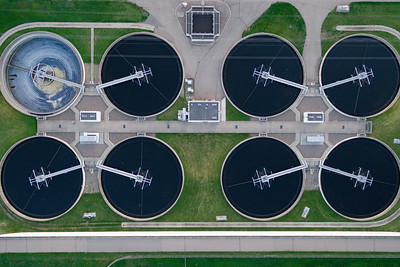If you want another example of the high-wage, high-demand jobs that Washtenaw County needs, consider this. Earlier this summer, Grand Rapids Community College received a $1M grant from the Environmental Protection Agency to create a training program for water treatment workers there.
According to the EPA, as much as half of the current water treatment workforce in the US is approaching retirement age, and there is no clear pipeline of replacement workers to be found. Cities cannot operate without clean drinking water and sewage treatment facilities. And water and sewage facilities cannot function without well-trained employees.
Although many water treatment workers can get entry-level jobs with a high school diploma, they require an enormous amount of on-the-job training and supervision. Currently, fewer than 10% of water treatment workers are under the age of 25, while 20 % of the workers in this sector are over the age of 55. Their retirements over the next decade will create significant demand for new workers to fill out the workforce.
The number of jobs in water treatment is actually dropping, due in part to technological improvements and automation. This doesn’t lessen the need for highly trained workers, who cannot be entirely replaced by technology. Additionally, newer technologies will require workers who are more technologically literate than the workers they’re replacing.
GRCC will work with the City of Grand Rapids to create a training program and recruit new workers into it. The program will also use some course materials developed by Bay College in Escanaba. Students in the program will work onsite in the city’s wastewater treatment facility. GRCC staff assume the grant will also likely help address worker shortages in other Western Michigan communities.
Water treatment is an evergreen opportunity
GRCC and the City of Grand Rapids began the grant-seeking process for this funding three years ago. This illustrates how long it can take to secure grant funding. It also underscores the need to collaborate with other agencies to make the grant proposal more attractive to federal funding agencies.
This is a great example of a high-wage, high-demand job that will employ people today as well as in the future. Water treatment is something that needs to be performed locally. You can only pump treated water so far, and you can only pump untreated sewage so far.
The City of Ann Arbor is well aware of the critical need to rebuild and expand its sanitary sewers. The age of the system, especially on the city’s southeast side, has caused and will continue to cause enormous problems for residents there. In addition, lack of capacity in the system restricts growth. You cannot outgrow your sewer system if you want to keep your home prices high and your neighborhoods desirable.
It’s not just Ann Arbor. Communities throughout Washtenaw County and southeast Michigan need a well trained water treatment workforce. Which of our Southeast Michigan community colleges are going to answer the call?
Photo Credit: Chad Davis, via Flickr









